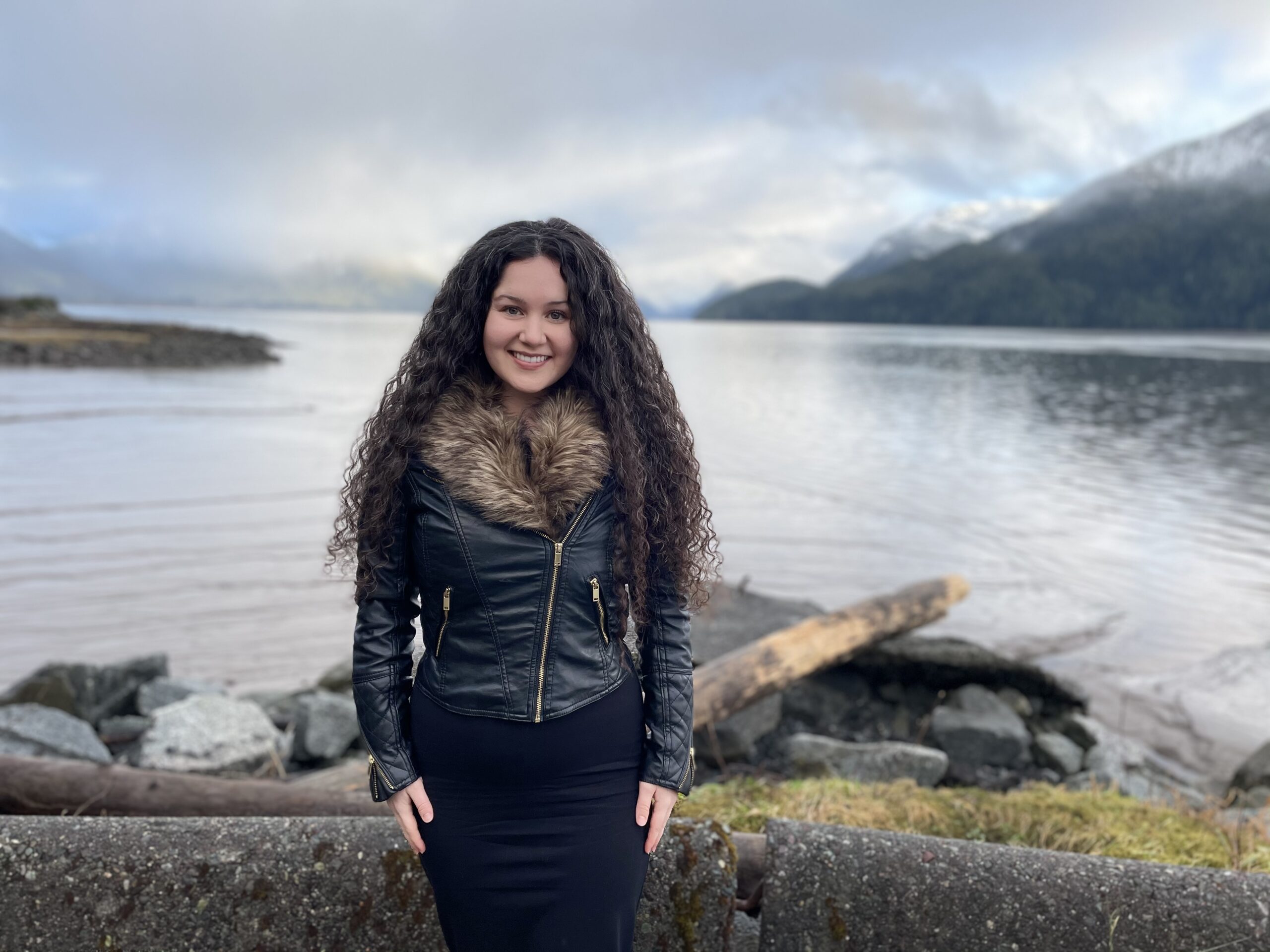Q & A: Rebecca Schuss (MSW 2020) shares how her experience studying Indigenous Trauma and Resiliency at the Factor-Inwentash Faculty led to law school
Categories: Alumni + Friends, Indigenous Trauma and Resiliency field of study, Q & A
When Rebecca Schuss began the Factor-Inwentash Faculty’s Indigenous Trauma and Resiliency (ITR) program, she wasn’t sure where it would lead her, but she was confident that the Master of Social Work field of study would set her on course to make a difference in her community. After graduating last year, she embarked on a path she didn’t expect to take: pursuing Juris Doctor (JD) and Juris Indigenarum Doctor (JID) degrees in law at the University of Victoria. With her MSW from University of Toronto in hand and her second semester of law school underway, she now has her sights set on opportunities to help improve access to justice and contribute to local and global systemic change. We asked Rebecca to tell us how her experience in the ITR program led her to where she is today.
What inspired you to pursue a Master of Social Work focused on Indigenous Trauma and Resiliency?
When I was a teenager, I took part in part in a workshop led by Jane Middelton-Moz. I saw the effect her work had on our community and this inspired me. The idea of “bridging the river” also resonated with me. On one side, we have neuroscience and mental health research, and on the other side, we have knowledge that has been passed down to us by our ancestors, in whichever culture that may be. It’s interesting: research is now coming out that supports what people have been doing for a long time — methods of addressing or sustaining mental health that we actually started to stray away from. I like to use the example of yoga which originated in ancient India. I love the book The Body Keeps the Score by Bessel Van der Kolk. He writes about the scientific evidence that supports the connection between our brain and our body and how yoga and breath work can reconcile these and help heal trauma. The MSW-ITR program bridges both of these understandings and trains us as social workers to recognize the power and necessity in doing this.
Could you tell us more about the workshop you took with Jane Middelton-Moz as a youth?
The foundation of it is that most of us, if not all, are affected by intergenerational trauma and individual trauma. We bring this into our interactions with others, in personal relationships, at work, with strangers. The workshop was structured to address this and a similar structure is used during the ITR intensives. If we want to be effective social workers and healthy people, we must first “clean our own basement if we want to help others clean theirs.”
What were your goals when you first applied to the ITR program? What did you hope to get out of it?
Because of Jane, I realized that healing from collective, global trauma is a huge part of the puzzle in trying to make the world a better place. I saw myself doing the type of work that she was doing. I witnessed the profound effect that it had. Even if it’s just a small group, the effects ripple out.
Plans are what we make until we know what we’re doing, and that’s what happened to me. It wasn’t until I was gaining experience in social work that I began to see how law could build on this foundation.
I know that my personal background is a part of what guides me as well. I’m Haisla First Nations on my mother’s side and German on my father’s side. I was raised entirely by my mother’s side of the family and I feel like I’ve been witnessing the effects of trauma and resiliency my whole life, as perhaps we all have. I’ve seen both: the horrible — including overrepresentation of Indigenous peoples in family violence, poverty, sexual abuse, suicide, grief — as well as the beauty — taking part in tradition and ceremony, being connected to your culture and your spirituality; this is all part of our identity, our healing, and our wellbeing. In my experience, there has been a disconnect between spirituality and education. Our spiritual self is a core part of us as humans and the MSW-ITR recognizes this.
All people are Indigenous to their roots of origin, and generational trauma knows no borders when it comes to war and disaster. The concepts we learn in the ITR program are designed to support people of all cultural backgrounds. After seeing Jane’s work and having read her books, I just knew that if I went in this direction, I would be gaining many powerful tools for my future work.
The ITR program is structured to allow students to do their practicum placements in their own community. What was your placement like?
It was so amazing. Before starting the program, I was working in the anti-violence sector and I was involved in community-based research. My first placement was within my health authority, providing social work support to patients with HIV as well as assisting a doctor in her research on the experiences of patients and families that have to travel or relocate for medical care. This topic is very important in rural communities as this too can be traumatizing when you or your family member is sick. I learned so much during this placement, and I also was given the opportunity to present our research findings at a conference.
In my second year, I worked at the Haisla Nation health centre, providing social work support. I appreciated being able to work in my home community, and this is another benefit of the ITR program. In Toronto, maybe your organization is more likely to be focused on one area due to the larger number of people being serviced, but in a smaller community, a service provider must be able to provide support in a variety of different areas, from housing to addictions to challenges associated with medical care, and you will likely have personal ties to clients as well.
What are you up to now?
This September I started law school at the University of Victoria in their joint degree program (JD/JID), which prepares you to work transsystemically. There are many countries in the world that are already doing this, with a bi-juridical or multi-juridical system that includes both common or civil law and customary law: for example, South Africa, Japan, Nepal, Morocco. The province of Quebec operates from both the common law and civil law. There are over 630 nations in Canada (almost 200 in BC alone) and each has a system of law that has been in place for centuries, and these laws and customs are still being applied today. We are learning how to work with and practice within different systems of law within Canada.
One of my professors once said that when you see breakdowns in a society, it is because their citizens do not have access to the law. I see a connection between this and social work. Contributing to efforts to improve access to justice is an important part of mental health and healing from intergenerational trauma.
What inspired you to pursue a law degree?
I had not considered law until I was talking to my manager and reflecting on how research can influence policy change. He planted this seed when he asked if I had ever thought of becoming a lawyer. I felt at that moment, “I will do it.” And, understanding the challenges that Indigenous people face, I was moved to apply for the JD/JID program —I knew that I would learn more ways I can help to create change, not only on an organizational or community level, but potentially at an international level.
How does your social work background mesh with what you are learning now?
Social work is a strong foundation to law. My classes include people from a variety of backgrounds, but quite a few were social workers in the past. There is certainly a huge overlap between the two fields. A knowledge of trauma and how it affects us is important when working with those who interact with the law. In the ITR program, we took classes on sexual abuse in the family, grief, addictions, counselling individuals and families, and creating community services. The content in all these courses relates to law. How wonderful would it be to have a trauma-informed mindset while working within the law and legal services and be able to bring that understanding to your clients when you are working with them? There is also an emphasis on selfcare which is particularly important when it comes to managing the high-stress responsibilities in our lives.
What advice do you have for people who are considering applying to the ITR program?
My first thought: do it! It is life changing and the MSW-ITR degree will open so many doors of opportunity. Of course, it is challenging but you really will come out as a better person and social worker. Imposter syndrome exists for everyone, and I definitely felt it, but the professors and faculty are extremely supportive. It was a unique and incredible educational experience. I grew so much during those two years, not only professionally in how I work with clients and coworkers, but also in my personal life, mentally, emotionally, and spiritually.
 The first of its kind in North America, the Factor-Inwentash Faculty’s Master of Social Work in Indigenous Trauma and Resiliency program is dedicated to preparing advanced social work professionals to work with individuals, families and communities who have been affected by historical and generational trauma. FIFSW is deeply grateful to the Fu Hui Education Foundation for its generous support to help sustain this important program and to provide financial assistance to ITR students. In 2020, the Foundation committed an additional gift to support a Leadership Scholars Program for ITR students to develop leadership skills that extend beyond social work and accelerated their professional and personal growth.
The first of its kind in North America, the Factor-Inwentash Faculty’s Master of Social Work in Indigenous Trauma and Resiliency program is dedicated to preparing advanced social work professionals to work with individuals, families and communities who have been affected by historical and generational trauma. FIFSW is deeply grateful to the Fu Hui Education Foundation for its generous support to help sustain this important program and to provide financial assistance to ITR students. In 2020, the Foundation committed an additional gift to support a Leadership Scholars Program for ITR students to develop leadership skills that extend beyond social work and accelerated their professional and personal growth.
Did you know?
The University of Toronto’s Factor-Inwentash Faculty of Social Work and the Faculty of Law offer a combined program leading to degrees of Juris Doctor and Master of Social Work. Intended for students who wish to practice in the areas where law and social work intersect (for example, child welfare, juvenile and criminal justice, dispute resolution, mental health and family law). Students complete the two degrees in four years, rather than the five it would take to pursue the two independently. Students who enter with a BSW will be given advanced standing. Find out more here.
More Q&As:
- Kalli Marsel talks about what it’s like to study social work at FIFSW
- Assistant Professor Kyle Ganson’s research addresses gaps in knowledge related to eating disorders and muscle-enhancing behaviors among boys and men
- Assistant Professor Ashley Quinn shares what inspired her to pursue social work and why she hopes more Indigenous students will join the field
- Professor David J. Brennan explores the impact of COVID-19 on the LGBTQ2+ community in Canada
- University Affairs interviews Associate Professor Tanya Sharpe about her Instagram Live series 30@8:30
- Ramona Alaggia on researching the impact of the #MeToo movement in Canada